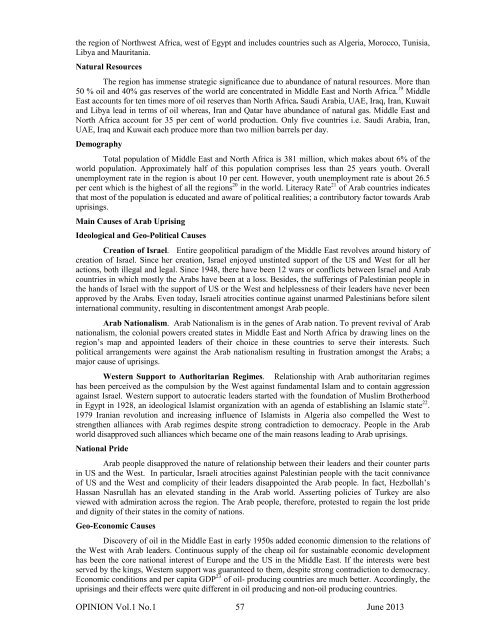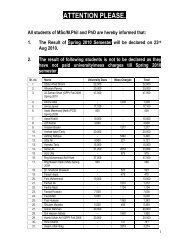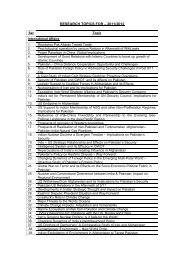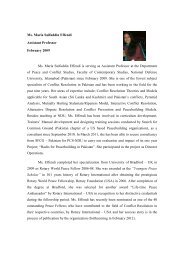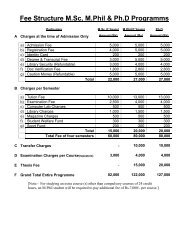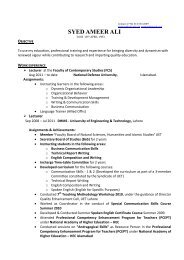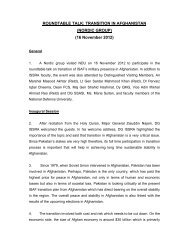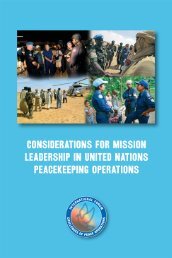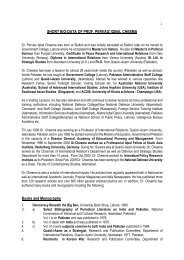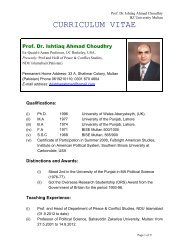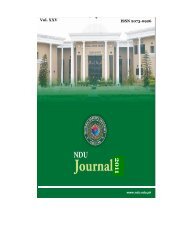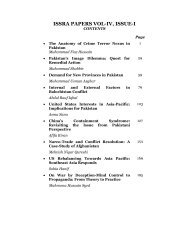OPINION Vol.1, No.1 June 2013 - National Defence University
OPINION Vol.1, No.1 June 2013 - National Defence University
OPINION Vol.1, No.1 June 2013 - National Defence University
You also want an ePaper? Increase the reach of your titles
YUMPU automatically turns print PDFs into web optimized ePapers that Google loves.
the region of Northwest Africa, west of Egypt and includes countries such as Algeria, Morocco, Tunisia,<br />
Libya and Mauritania.<br />
Natural Resources<br />
The region has immense strategic significance due to abundance of natural resources. More than<br />
50 % oil and 40% gas reserves of the world are concentrated in Middle East and North Africa. 19 Middle<br />
East accounts for ten times more of oil reserves than North Africa. Saudi Arabia, UAE, Iraq, Iran, Kuwait<br />
and Libya lead in terms of oil whereas, Iran and Qatar have abundance of natural gas. Middle East and<br />
North Africa account for 35 per cent of world production. Only five countries i.e. Saudi Arabia, Iran,<br />
UAE, Iraq and Kuwait each produce more than two million barrels per day.<br />
Demography<br />
Total population of Middle East and North Africa is 381 million, which makes about 6% of the<br />
world population. Approximately half of this population comprises less than 25 years youth. Overall<br />
unemployment rate in the region is about 10 per cent. However, youth unemployment rate is about 26.5<br />
per cent which is the highest of all the regions 20 in the world. Literacy Rate 21 of Arab countries indicates<br />
that most of the population is educated and aware of political realities; a contributory factor towards Arab<br />
uprisings.<br />
Main Causes of Arab Uprising<br />
Ideological and Geo-Political Causes<br />
Creation of Israel. Entire geopolitical paradigm of the Middle East revolves around history of<br />
creation of Israel. Since her creation, Israel enjoyed unstinted support of the US and West for all her<br />
actions, both illegal and legal. Since 1948, there have been 12 wars or conflicts between Israel and Arab<br />
countries in which mostly the Arabs have been at a loss. Besides, the sufferings of Palestinian people in<br />
the hands of Israel with the support of US or the West and helplessness of their leaders have never been<br />
approved by the Arabs. Even today, Israeli atrocities continue against unarmed Palestinians before silent<br />
international community, resulting in discontentment amongst Arab people.<br />
Arab <strong>National</strong>ism. Arab <strong>National</strong>ism is in the genes of Arab nation. To prevent revival of Arab<br />
nationalism, the colonial powers created states in Middle East and North Africa by drawing lines on the<br />
region’s map and appointed leaders of their choice in these countries to serve their interests. Such<br />
political arrangements were against the Arab nationalism resulting in frustration amongst the Arabs; a<br />
major cause of uprisings.<br />
Western Support to Authoritarian Regimes. Relationship with Arab authoritarian regimes<br />
has been perceived as the compulsion by the West against fundamental Islam and to contain aggression<br />
against Israel. Western support to autocratic leaders started with the foundation of Muslim Brotherhood<br />
in Egypt in 1928, an ideological Islamist organization with an agenda of establishing an Islamic state 22 .<br />
1979 Iranian revolution and increasing influence of Islamists in Algeria also compelled the West to<br />
strengthen alliances with Arab regimes despite strong contradiction to democracy. People in the Arab<br />
world disapproved such alliances which became one of the main reasons leading to Arab uprisings.<br />
<strong>National</strong> Pride<br />
Arab people disapproved the nature of relationship between their leaders and their counter parts<br />
in US and the West. In particular, Israeli atrocities against Palestinian people with the tacit connivance<br />
of US and the West and complicity of their leaders disappointed the Arab people. In fact, Hezbollah’s<br />
Hassan Nasrullah has an elevated standing in the Arab world. Asserting policies of Turkey are also<br />
viewed with admiration across the region. The Arab people, therefore, protested to regain the lost pride<br />
and dignity of their states in the comity of nations.<br />
Geo-Economic Causes<br />
Discovery of oil in the Middle East in early 1950s added economic dimension to the relations of<br />
the West with Arab leaders. Continuous supply of the cheap oil for sustainable economic development<br />
has been the core national interest of Europe and the US in the Middle East. If the interests were best<br />
served by the kings, Western support was guaranteed to them, despite strong contradiction to democracy.<br />
Economic conditions and per capita GDP 23 of oil- producing countries are much better. Accordingly, the<br />
uprisings and their effects were quite different in oil producing and non-oil producing countries.<br />
<strong>OPINION</strong> <strong>Vol.1</strong> <strong>No.1</strong> 57 <strong>June</strong> <strong>2013</strong>


